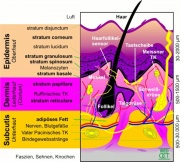Difference between revisions of "Dermis"
Jump to navigation
Jump to search
(username removed) |
|||
| (2 intermediate revisions by 2 users not shown) | |||
| Line 1: | Line 1: | ||
[[File:HautAufbauf5.jpg|thumb|Drawing of skin structure]] | [[File:HautAufbauf5.jpg|thumb|Drawing of skin structure]] | ||
== Description == | == Description == | ||
| − | + | [[File:hagfishskinwp2.jpg|thumb|Hagfish skin]] | |
| − | The skin of mammals is composed of an outer [ | + | The skin of mammals is composed of an outer [[epidermis]], a center dermis layer and an inner [[hypodermis]] layer. The dermis, or corium, is a dense, interconnected tissue layer that contains hair follicles, sweat glands, nerve endings and blood vessels. The dermis is the strongest part of the skin and is used to produce leather. |
== Synonyms and Related Terms == | == Synonyms and Related Terms == | ||
| Line 8: | Line 8: | ||
corium; cutis; derma; Dermis (Deut., Esp., Ned.); derme (Port.); läderhuden (Sven.); lederhuid (Ned.) | corium; cutis; derma; Dermis (Deut., Esp., Ned.); derme (Port.); läderhuden (Sven.); lederhuid (Ned.) | ||
| − | == | + | ==Resources and Citations== |
| − | |||
| − | |||
| − | |||
| − | |||
| − | |||
| − | |||
| − | |||
* Hermann Kuhn, ''Conservation and Restoration of Works of Art and Antiquities'', Butterworths, London, 1986 | * Hermann Kuhn, ''Conservation and Restoration of Works of Art and Antiquities'', Butterworths, London, 1986 | ||
| Line 21: | Line 14: | ||
* Matt Roberts, Don Etherington, ''Bookbinding and the Conservation of Books: a Dictionary of Descriptive Terminology'', U.S. Government Printing Office, Washington DC, 1982 | * Matt Roberts, Don Etherington, ''Bookbinding and the Conservation of Books: a Dictionary of Descriptive Terminology'', U.S. Government Printing Office, Washington DC, 1982 | ||
| − | * ''Encyclopedia Britannica'', http://www.britannica.com Comment: "dermis." | + | * ''Encyclopedia Britannica'', http://www.britannica.com Comment: "dermis." Accessed 17 Nov. 2004. |
| − | * Wikipedia | + | * Wikipedia: http://en.wikipedia.org/wiki/Dermis (Accessed Jan. 25, 2006) |
* Random House, ''Webster's Encyclopedic Unabridged Dictionary of the English Language'', Grammercy Book, New York, 1997 | * Random House, ''Webster's Encyclopedic Unabridged Dictionary of the English Language'', Grammercy Book, New York, 1997 | ||
Latest revision as of 14:56, 18 July 2022
Description
The skin of mammals is composed of an outer Epidermis, a center dermis layer and an inner Hypodermis layer. The dermis, or corium, is a dense, interconnected tissue layer that contains hair follicles, sweat glands, nerve endings and blood vessels. The dermis is the strongest part of the skin and is used to produce leather.
Synonyms and Related Terms
corium; cutis; derma; Dermis (Deut., Esp., Ned.); derme (Port.); läderhuden (Sven.); lederhuid (Ned.)
Resources and Citations
- Hermann Kuhn, Conservation and Restoration of Works of Art and Antiquities, Butterworths, London, 1986
- Matt Roberts, Don Etherington, Bookbinding and the Conservation of Books: a Dictionary of Descriptive Terminology, U.S. Government Printing Office, Washington DC, 1982
- Encyclopedia Britannica, http://www.britannica.com Comment: "dermis." Accessed 17 Nov. 2004.
- Wikipedia: http://en.wikipedia.org/wiki/Dermis (Accessed Jan. 25, 2006)
- Random House, Webster's Encyclopedic Unabridged Dictionary of the English Language, Grammercy Book, New York, 1997
- The American Heritage Dictionary or Encarta, via Microsoft Bookshelf 98, Microsoft Corp., 1998

